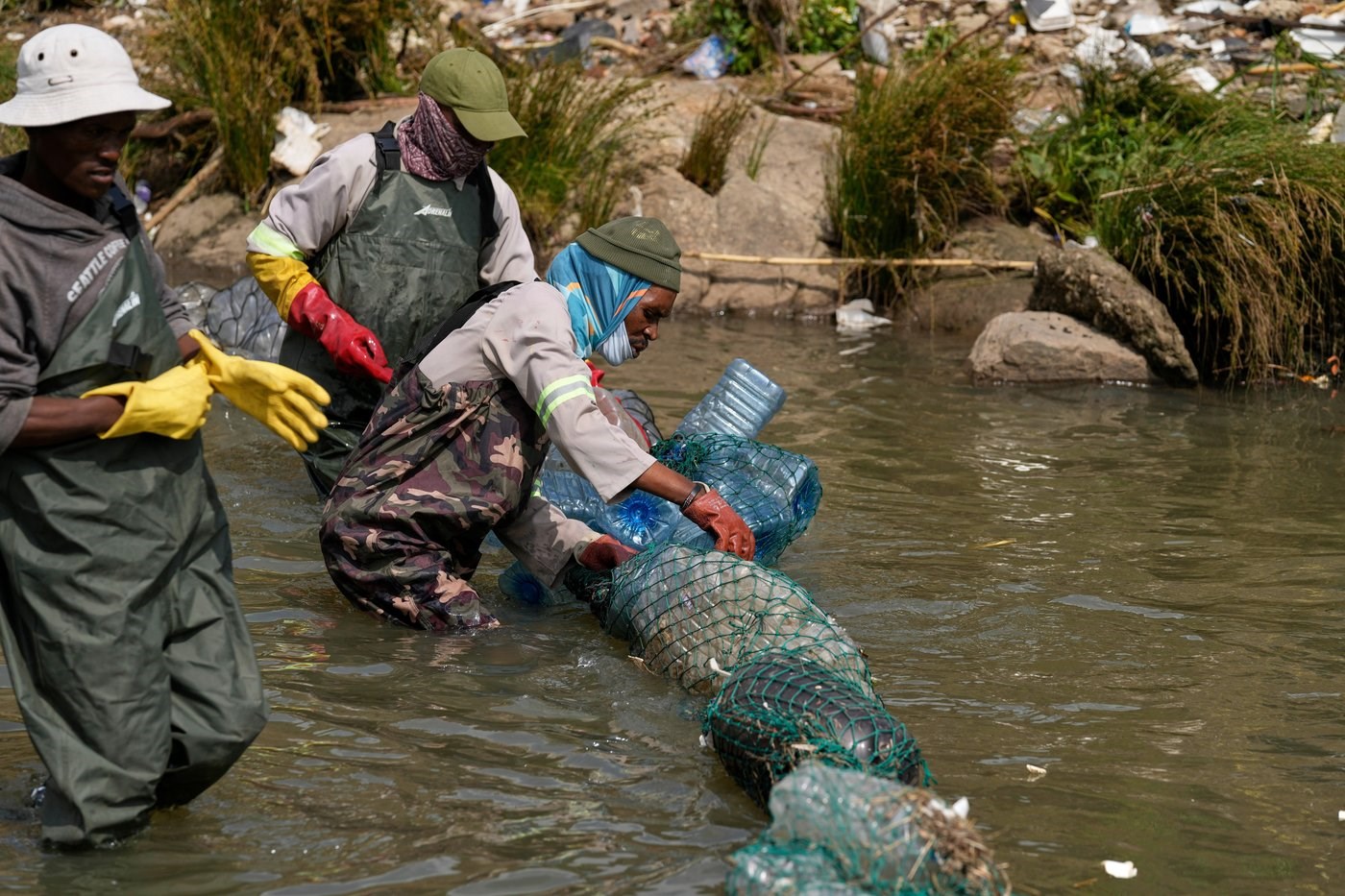
Volunteers wearing wetsuits untangle a long garbage net on the Jukskei River in the Alexandra township in Johannesburg, South Africa, Wednesday, Nov. 12, 2025. (AP Photo/Themba Hadebe)
November 18, 2025 - 2:45 PM
JOHANNESBURG (AP) — In South Africa ’s oldest township, volunteers in wetsuits jump into the thigh-deep water of the polluted Jukskei River to untangle a net that's designed to trap garbage but damaged by heavy rains. Without the nets, the shacks of low-lying Alexandra on the outskirts of Johannesburg could face disastrous flooding.
World leaders with the Group of 20 rich and developing nations will meet this weekend in Johannesburg for the bloc’s first summit in Africa. Host South Africa wants to prioritize issues affecting poor countries, including responses to disasters made worse by climate change.
South Africa will urge rich countries and international financial institutions to help more — a plea also being made at global climate talks in Brazil.
Alexandra's over half a million residents live within steps of South Africa’s richest financial district, Sandton. But flooding often submerges bridges, leaving the township's children unable to get to school. It is a “big hazard,” said Semadi Manganye, a resident and co-founder of the volunteer group, the Alexandra Water Warriors.
Devastating for poor countries
“The ravages of the climate are directly linked to the ravages of inequality,” Binaifer Nowrojee, president of the Open Society Foundations, a non-governmental organization promoting democracy and governance, told The Associated Press. “Countries are facing the destructive choice between growing their economies and taking climate action.”
The World Bank says the poorest countries were hit by nearly eight times as many natural disasters in the decade from 2010-2020 as they were from 1980-1990.
Southern Africa has been struck by strong tropical storms in the past decade, killing thousands of people and leaving nations with unbearable rebuilding costs. Cyclone Idai, which scientists say was made more powerful by climate change, ripped through Mozambique, Malawi and Zimbabwe in 2019, causing an estimated $2 billion worth of damage, according to the World Bank. Malawi’s gross domestic product is just $12 billion.
Last year, the El Nino weather phenomenon caused one of the worst droughts in decades in the region, devastating small-scale agriculture and leaving people even poorer.
Lobbying world leaders
Climate financing has been a focus of sharp debate between rich and poor countries at major summits like the G20.
Rich countries agreed at last year’s United Nations climate summit to pool at least $300 billion a year by 2035 to help developing countries deal with the impacts of climate change and weather disasters. But independent experts said much more — an estimated $1 trillion a year — was needed by 2030.
One of the world's largest polluters, the United States, won't even attend this weekend's G20 summit as it boycotts over U.S. President Donald Trump’s widely rejected claims that South Africa is violently persecuting a white minority.
That makes action on climate, or even a meaningful declaration, from the G20 a tall order.
South Africa’s own failures
The Alexandra Water Warriors have considered themselves the guardians of their environment since they formed in 2021, planting native trees to reduce urban heat and collecting and recycling trash from the river.
They face the kind of challenges seen in other townships and poor settlements across South Africa, which is the continent’s most developed economy but also has some of the world’s most dramatic inequality.
An Amnesty International report released this month for the G20 summit said the South African government is failing as many as 5 million people who live in informal settlements without proper housing and services and are impacted by the climate crisis. It said they are often forced to live in vulnerable, low-lying areas close to rivers.
Floods in June in South Africa’s Eastern Cape province killed more than 100 people. While South African President Cyril Ramaphosa said they were exacerbated by climate change, local officials said they were made deadlier due to poor housing and broken-down infrastructure in one of the country’s poorest regions.
Green growth
Ntombi Maponya is one of around 3,000 people working with the Alexandra Water Warriors or other local projects who are rewarded with a small monthly stipend from a private-public collection of donors that includes the South African and Canadian governments.
“When the 25th of every month comes around, you begin to smile,” she said.
The effort launched in 2022 has grown from 250 people.
Climate resilience should be seen as a strategy to spur development, said Cameroonian economist Vera Songwe, a former executive secretary of the U.N. Economic Commission for Africa.
“The good news ... is that actually green, sustainable and resilient growth is much faster growth,” she told reporters during an event on the debt crisis ahead of the G20.
___
Follow AP’s coverage of the G20 summit in South Africa: https://apnews.com/hub/g20-summit
___
For more on Africa and development: https://apnews.com/hub/africa-pulse
The Associated Press receives financial support for global health and development coverage in Africa from the Gates Foundation. The AP is solely responsible for all content. Find AP’s standards for working with philanthropies, a list of supporters and funded coverage areas at AP.org.
News from © The Associated Press, 2025